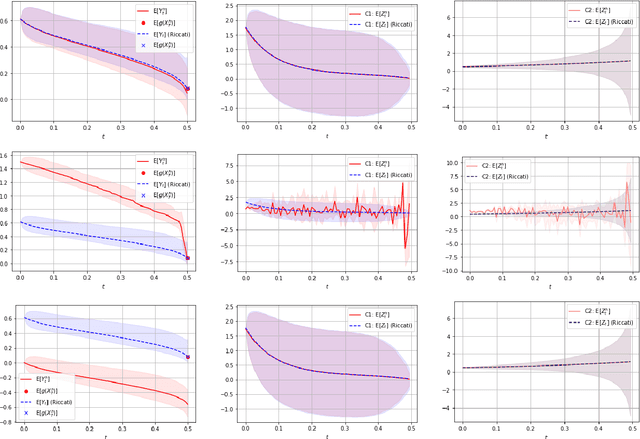Kristoffer Andersson
A deep solver for backward stochastic Volterra integral equations
May 23, 2025Abstract:We present the first deep-learning solver for backward stochastic Volterra integral equations (BSVIEs) and their fully-coupled forward-backward variants. The method trains a neural network to approximate the two solution fields in a single stage, avoiding the use of nested time-stepping cycles that limit classical algorithms. For the decoupled case we prove a non-asymptotic error bound composed of an a posteriori residual plus the familiar square root dependence on the time step. Numerical experiments confirm this rate and reveal two key properties: \emph{scalability}, in the sense that accuracy remains stable from low dimension up to 500 spatial variables while GPU batching keeps wall-clock time nearly constant; and \emph{generality}, since the same method handles coupled systems whose forward dynamics depend on the backward solution. These results open practical access to a family of high-dimensional, path-dependent problems in stochastic control and quantitative finance.
Convergence of a robust deep FBSDE method for stochastic control
Feb 06, 2022



Abstract:In this paper we propose a deep learning based numerical scheme for strongly coupled FBSDE, stemming from stochastic control. It is a modification of the deep BSDE method in which the initial value to the backward equation is not a free parameter, and with a new loss function being the weighted sum of the cost of the control problem, and a variance term which coincides with the means square error in the terminal condition. We show by a numerical example that a direct extension of the classical deep BSDE method to FBSDE, fails for a simple linear-quadratic control problem, and motivate why the new method works. Under regularity and boundedness assumptions on the exact controls of time continuous and time discrete control problems we provide an error analysis for our method. We show empirically that the method converges for three different problems, one being the one that failed for a direct extension of the deep BSDE method.
 Add to Chrome
Add to Chrome Add to Firefox
Add to Firefox Add to Edge
Add to Edge